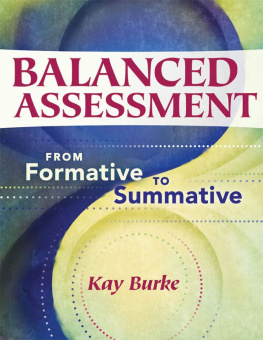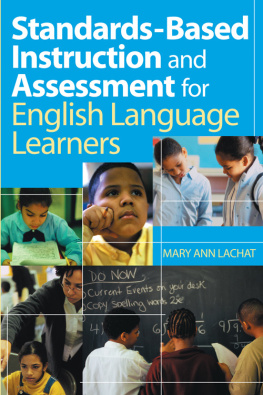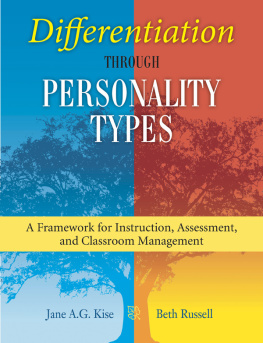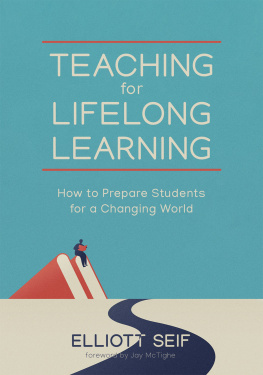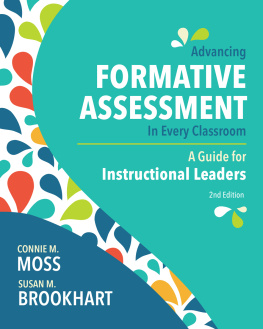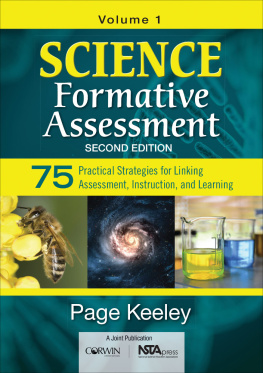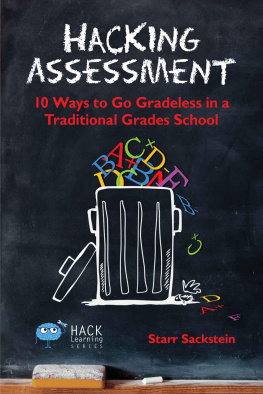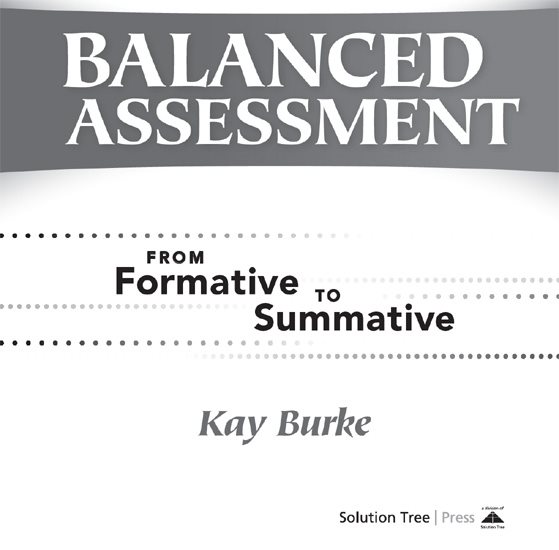
Copyright 2010 by Solution Tree Press
All rights reserved, including the right of reproduction of this book in whole or in part in any form.
555 North Morton Street
Bloomington, IN 47404
800.733.6786 (toll free) / 812.336.7700
FAX: 812.336.7790
email:
solution-tree.com
Printed in the United States of America
14 13 12 11 3 4 5
Excerpts from Georgia Performance Standards reprinted with permission from the Georgia Department of Education. 2010 Georgia Department of Education. All rights reserved.
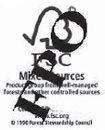
Library of Congress Cataloging-in-Publication Data
Burke, Kay.
Balanced assessment : from formative to summative / Kay Burke.
p. cm.
Includes bibliographical references and index.
ISBN 978-1-934009-52-9 (perfect bound) -- ISBN 978-1-935249-24-5 (library binding) 1. Educational evaluation--United States. 2. Education--Standards--United States. I. Title.
LB2822.75.B88 2010
371.26--dc22
2009051128
Solution Tree
Jeffrey C. Jones, CEO & President
Solution Tree Press
President: Douglas M. Rife
Publisher: Robert D. Clouse
Vice President of Production: Gretchen Knapp
Managing Production Editor: Caroline Wise
Senior Production Editor: Ris Koben
Proofreader: Rachel Rosolina
Text and Cover Designer: Orlando Angel
To Carol M. Brownmy sister and my friend
Acknowledgments
I would like to offer a very special thank you to the following district and school administrators, curriculum specialists, coaches, and teachers, who not only worked together on teams to develop creative assessments for their students but generously allowed me to share their work in this book:
Carrollton City Schools, Carrollton, Georgia
Erin McGinnis (director of school improvement and curriculum/instruction)
Carrollton Middle School (grades 45): Trent North (principal); Debbie Williams (formerly associate principal; currently associate principal of Carrollton Elementary School); and Marva Bell, Lori Higgs, LaKeia King, and Shanon Melson (teachers)
Carrollton Junior High School (grades 68): Todd Simpson (principal); John Megathlin, Kisha Mitchell, Amy Mulvehill, and Camille Sanders (language arts teachers); and Patti Allen and Matilda Strickland (math teachers)
Clarke County School District, Athens, Georgia
Noris Price (associate superintendent of instruction), Mark Tavernier (director of the Office of Teaching and Learning), Veronica Jackson (administrative assistant), Kate Arnold (elementary math content specialist), Julie Bower (social studies content specialist), Claude Gonzalez (science content specialist), Glenda Huff (secondary math content specialist), and Barbara Michalove (elementary language arts content specialist)
Third-grade Desk Dilemma math unit: Kate Arnold (elementary math content specialist); Daphne Hall and Lisa Stanzi (elementary instructional coaches); and Lisa Lane (teacher)
Fourth-grade Wanted: Snack Thief! math unit: Molly Efland, Laura Forehand, and Brian Madej (elementary instructional coaches); and Joyce Moeller and Jenna Starnes (teachers)
Fourth-grade H2O: Where Did You Go? science unit: Barbara Michalove (elementary language arts content specialist); Scherry Lewis and Claire Smith (elementary instructional coaches); and Carrie Bette-Duncan and Halley Page (teachers)
Fifth-grade Fun With Fractions! math unit: Louise Brockinton, Susan Cardin, and Kerstin Long (elementary instructional coaches); and Julie Hinkle and Leah York (teachers)
Fifth-grade Changes in the Nye-ght science unit: Karen Higginbotham (gifted specialist); Jan Miller-Burkins and Hallie Williamson (elementary instructional coaches); and Bertha Troutman-Rambeau (teacher)
Cobb County School District, Marietta, Georgia
Nancy Larimer and Andrew Smith (professional learning supervisors); Tracy Boyles and Ashley Kirby (area lead teachers); and John Christian Cali (teacher)
College of William and Mary, Williamsburg, Virginia
Whitney Slough (student in the Foreign Language Instructional Planning course taught by Janet D. Parker, School of Education, spring 2009)
Coweta County School District, Newnan, Georgia
Evans Middle School (grades 68): Brenda Foyle and Sean Parker (math teachers)
DeKalb County School System, Decatur, Georgia
Champion Theme Middle School (grades 68): Yvonne Stroud (teacher)
I appreciate all the help of Susan Gray and Jodi Keller and thank them for their invaluable assistance. I would also like to thank Claudia Wheatley, education specialist; Douglas Rife, president; and Gretchen Knapp, vice president of production, at Solution Tree Press for their support and flexibility and for allowing me to work with Ris Koben, senior production editor. Riss expertise, patience, and sense of humor have inspired me to become a better writer and person. On my summative rubric for editors, she scores an Exceeds All Expectations.
Solution Tree Press would like to thank the following reviewers:
Lisa Almeida
Senior Professional Development Associate
The Leadership and Learning Center
Englewood, Colorado
Heidi Andrade
Associate Professor, Department of
Educational and Counseling Psychology
University at Albany
State University of New York
Albany, New York
Victoria L. Bernhardt
Executive Director
Education for the Future
Chico, California
Joseph Schrock
Director of Assessment
Jackson Public Schools
Jackson, Mississippi
Harry G. Tuttle
Educational Consultant
Mattydale, New York
Nance S. Wilson
Assistant Professor, Department of Teaching
and Learning Principles
University of Central Florida Orlando, Florida
Visit go.solution-tree.com/assessment
to download selected figures and forms.
Table of Contents
About the Author
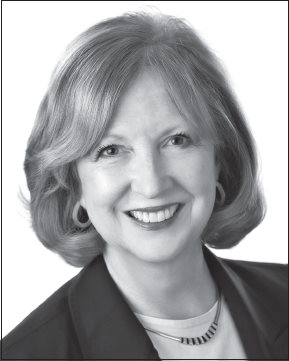
Kay Burke works with her colleagues at Kay Burke & Associates to present professional development workshops for teachers and administrators on standards-based teaching and learning, formative assessment, and classroom management. She received her undergraduate degree from Florida Atlantic University, her masters degree from the University of Central Florida, her educational specialist degree from Emory University, her PhD from Georgia State University, and her administration certification from the University of Georgia.
Kay served as an award-winning English teacher, department chairperson, dean of students, mentor, and administrator in Florida and Georgia for twenty years. She also was the director of the field-based masters program sponsored by the International Renewal Institute (IRI/SkyLight) and Saint Xavier University in Illinois. Since 1990, Kay has designed and conducted professional development workshops and presented at conferences of the National Staff Development Council, the Association for Supervision and Curriculum Development, the National Association of Secondary School Principals, the National Association of Elementary School Principals, Solution Tree, and the International Reading Association, as well as at international conferences in Canada and Australia.
Next page
